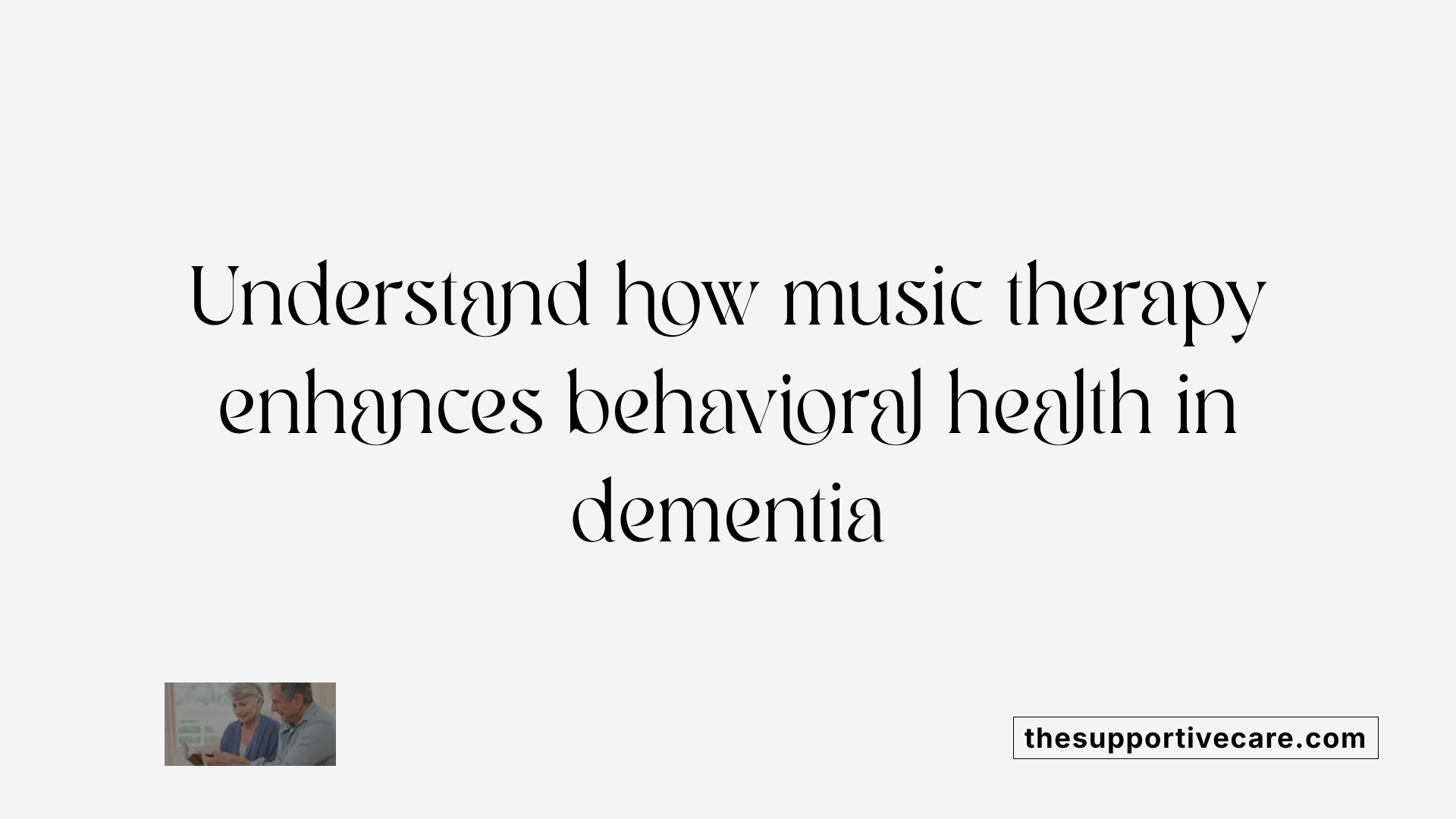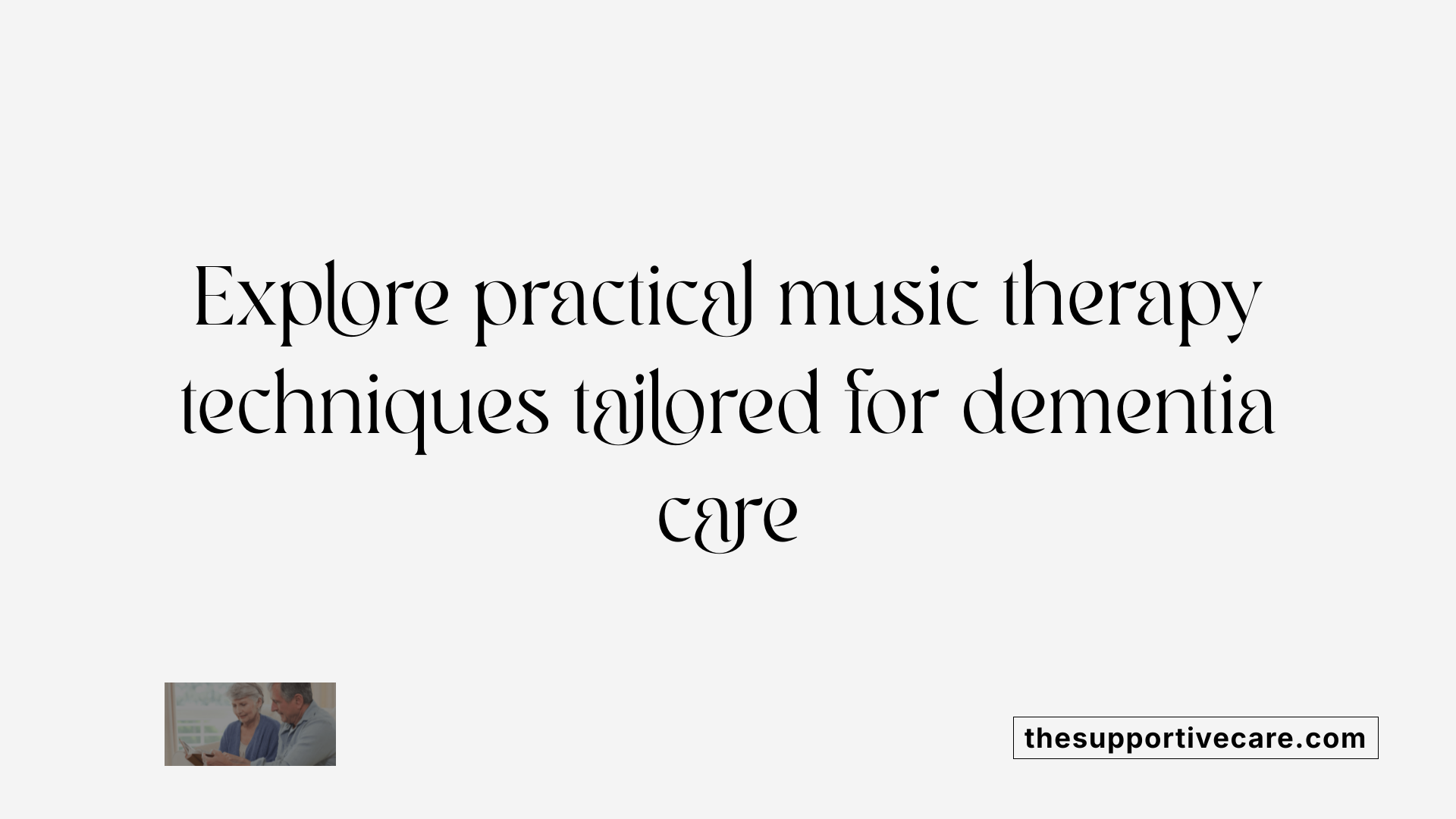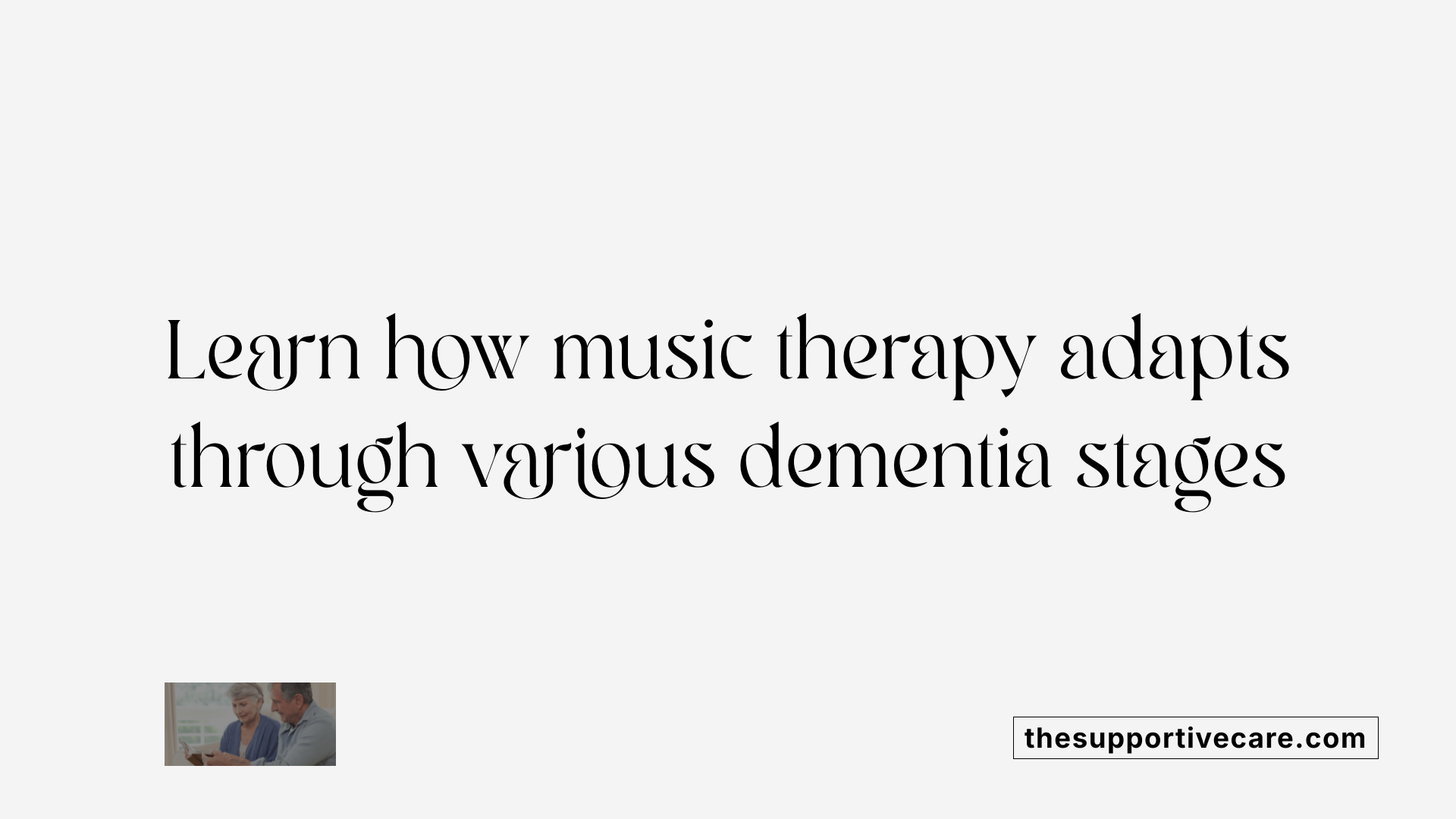Unlocking the Therapeutic Benefits of Music for Dementia Patients
Music therapy has emerged as a vital, evidence-based strategy in supporting behavioral health outcomes for individuals living with dementia. By engaging the brain through personalized musical interventions, it promotes emotional well-being, cognitive preservation, and social connection, ultimately enhancing quality of life across all stages of the disease.
How Music Therapy Supports Behavioral Health Goals in Dementia

How does music therapy support behavioral health goals in dementia patients?
Music therapy plays a vital role in improving the overall behavioral health of individuals with dementia. It helps promote emotional well-being by elevating mood, reducing symptoms of depression, and fostering positive emotional expression. Engaging with familiar or preferred music can evoke long-term memories and emotional responses that remain intact despite cognitive decline.
One significant benefit of music therapy is its ability to decrease agitation and manage psychological symptoms such as anxiety and depression. By engaging patients through singing, listening, or movement, therapies help redirect frustration and frustration, creating a calming environment.
Music stimulates multiple areas of the brain involved in memory, emotion, and cognitive functions. These include activating neural pathways that are often spared until the later stages of dementia. This neuroplastic response can support brain recovery and help slow cognitive decline.
Personalization is a cornerstone of effective music therapy. Tailoring interventions—such as selecting songs from the patient’s youth or cultural background—enhances engagement and effectiveness. Therapists often incorporate activities like singing or playing familiar tunes to foster social interaction and nonverbal communication.
Moreover, music therapy encourages social engagement, which is essential for emotional health. It can help people with dementia connect more meaningfully with caregivers and peers, reducing social withdrawal and promoting a sense of belonging.
Importantly, as a nonpharmacological approach, music therapy can reduce dependence on medications aimed at controlling behavioral symptoms. Its holistic, multimodal framework addresses physical, emotional, and cognitive needs simultaneously.
Overall, music therapy’s ability to improve mood, enhance communication, and activate brain functions makes it a powerful tool for supporting behavioral health goals in dementia care, leading to improved quality of life for patients and their families.
Scientific Evidence and Research Findings Supporting Music Therapy

What scientific evidence supports the use of music therapy in dementia care?
A substantial body of research, including systematic reviews and clinical trials, confirms the positive impact of music therapy on individuals living with dementia. These studies consistently demonstrate that music therapy can significantly reduce behavioral and psychological symptoms such as agitation, depression, and anxiety.
Systematic reviews of over 80 high-quality studies reveal that nonpharmacological approaches like music therapy are effective in enhancing mood, social interaction, and cognitive functions. For example, many studies have shown that music therapy can decrease agitation and improve communication by stimulating neural pathways involved in emotional and social processes.
Research also indicates that music activates specific brain regions that are less vulnerable to neurodegeneration. The limbic system, responsible for emotion, and areas involved in long-term musical memory often remain intact in dementia patients. This differential preservation explains how musical memories and responses can be maintained even in later stages.
Moreover, engaging in active and personalized music interventions promotes neuroplasticity—the brain's capacity to reorganize itself—leading to improved cognitive health, mood, and emotional resilience. Such interventions include singing, songwriting, or playing instruments tailored to individual preferences, resulting in better engagement and therapeutic benefits.
In two recent randomized controlled trials, participants who received personalized music therapy showed greater improvements in mood, behavior, and memory compared to control groups. These findings underscore the importance of individualized approaches that align with each person’s history and preferences.
Overall, the extensive scientific evidence underscores music therapy as a safe, accessible, and effective means to improve quality of life for those with dementia, supporting its integration into comprehensive care strategies.
Mechanisms and Methods of Music Therapy in Dementia Patients

What are the mechanisms and methods of music therapy used with dementia patients?
Music therapy for dementia integrates various techniques to stimulate the brain, reduce behavioral symptoms, and promote emotional well-being. It employs both active and receptive approaches to tailor interventions to individual needs.
Active music interventions include singing, songwriting, improvisation, and movement, encouraging direct participation. These activities can trigger neural pathways related to memory, language, and coordination, helping to evoke familiar memories and foster self-expression.
Passive methods involve guided listening to personalized music playlists. When music that resonates with the individual is played, especially familiar tunes from their youth, it can activate preserved brain regions and evoke autobiographical memories, often bypassing damaged cognitive pathways.
Personalized and familiar music plays a crucial role in engaging dementia patients. Tailoring playlists based on personal preferences increases emotional responses and participation. This customization supports neuroplasticity, helping the brain form new connections and reinforcing existing ones.
Engagement through singing, songwriting, movement, and improvisation not only stimulates neural circuits but also enhances mood, communication, and social interaction. Moving to music, clapping, or dancing can improve motor skills and physical health.
Trained music therapists are essential in designing and adapting these interventions. They assess the patient's abilities, needs, and preferences, creating goals and selecting appropriate musical activities. Therapists use techniques like improvisation and lyric analysis to promote cognitive and emotional health.
Music therapy impacts multiple brain networks, including those involved in emotion, memory, and executive functions. It leverages the brain’s natural response to music, which is largely intact even in later stages of dementia, as musical memory often remains preserved longer.
Overall, these methods provide a low-cost, accessible, and enjoyable therapeutic avenue, supporting quality of life and cognitive function in individuals with dementia.
Scientific Evidence Supporting Music Therapy in Dementia Care
What scientific evidence supports the use of music therapy in dementia care?
Research findings strongly back the application of music therapy as an effective approach for managing dementia symptoms. Multiple systematic reviews and meta-analyses have demonstrated that music therapy significantly reduces behavioral and psychological symptoms such as agitation, depression, and anxiety. For example, several high-quality studies show improvements in mood, social interaction, and cognitive function, highlighting its role as a beneficial non-drug intervention.
Brain imaging studies reveal that music activates the limbic system involved in emotion regulation and other brain regions associated with memory, especially in the long-term musical memories often preserved in dementia. This brain activation helps retrieve memories and reinforces emotional connections, which can be particularly therapeutic.
Furthermore, engaging in personalized, active music interventions—such as singing, playing instruments, or songwriting—appears to enhance neuroplasticity. This capacity for the brain to rewire and adapt supports improved cognition and emotional health in individuals with dementia.
Compared to passive listening, active participation in music therapy tends to produce greater benefits. It encourages physical movement, verbal expression, and social interaction, which collectively contribute to better overall well-being.
Overall, the extensive body of scientific evidence indicates that music therapy offers a safe, cost-effective, and enjoyable method for improving behavioral, emotional, and cognitive outcomes in dementia care. Its ability to stimulate less affected brain regions and evoke memories supports its integration into comprehensive treatment plans for individuals at all stages of dementia.
| Evidence Type | Findings | Description |
|---|---|---|
| Systematic reviews and meta-analyses | Show significant reductions in agitation, depression, and behavioral disturbances | Summarize multiple studies confirming therapeutic benefits |
| Brain imaging studies | Demonstrate activation in limbic and memory-related areas | Explain neural mechanisms behind mood and memory improvements |
| Clinical trials | Correlate active, personalized musical interventions with better outcomes | Emphasize importance of individualized approaches |
| Comparative studies | Active musical engagement outperforms passive listening | Highlight the enhanced effects of doing rather than just hearing music |
This robust scientific support underscores the importance of incorporating music therapy into dementia care, offering a holistic, accessible, and effective strategy to enhance quality of life.
Impact of Music Therapy on Cognitive Functions and Well-Being
How does music therapy impact cognitive functions and overall well-being of dementia patients?
Music therapy has a profound positive influence on the cognitive abilities and emotional health of individuals living with dementia. It actively stimulates multiple brain regions responsible for memory, language, and emotion, helping to preserve these functions even as the disease progresses.
Research, including systematic reviews of high-quality randomized controlled trials, indicates that music therapy can notably improve global cognition, enhance memory recall, and foster better communication skills. Techniques such as engaging in singing, improvisation, or listening to personalized, familiar music encourage participation and evoke long-term memories, which are often spared until the later stages of dementia.
Besides cognitive improvements, music therapy effectively reduces problematic behaviors like agitation, anxiety, and depression. This reduction significantly elevates the quality of life for patients, providing emotional stability and social engagement.
The neurobiological mechanisms behind these benefits involve the activation of the limbic system, a brain area critical to emotion regulation. Music also promotes neuroplasticity—encouraging the brain to adapt and form new connections—by stimulating neuronal activity through rewards like dopamine and serotonin release.
Furthermore, music influences neurochemical pathways that regulate mood and stress, inducing feelings of well-being and relaxation. It offers an accessible, non-drug approach that can be integrated into daily routines by caregivers to support emotional expression, social interaction, and cognitive health.
In summary, music therapy's holistic impact lies in its ability to delay cognitive decline, improve communication, and boost emotional resilience, making it an essential component of comprehensive dementia care.
Practical Applications, Techniques, and Models of Music Therapy in Dementia Care

What are the practical applications, techniques, and models of music therapy in dementia care?
Music therapy employs both receptive and active methods tailored to the individual's needs at different stages of dementia. Receptive techniques involve guided listening to personalized playlists or familiar music, which helps evoke memories, enhance mood, and soothe agitation. Active interventions include singing, playing instruments, songwriting, and movement, all supported by personalized choices and preferred music to engross patients and stimulate brain regions responsible for emotion, memory, and communication.
Therapists often use improvisation and reminiscence activities to foster social interaction and emotional expression. These interventions are designed with systematic assessment, goal-setting, and continuous evaluation, ensuring they address each person’s unique cognitive and emotional profile. For example, playing music from a person's youth or using favorite songs can trigger long-term memories and support cognitive maintenance.
Clinical models often incorporate multimodal engagement — combining music with movement, speech, and social activities — to maximize neural activation. The use of technology, such as digital playlists or apps, enhances access and routine application, making it easier to incorporate music practices into daily care routines at home or in institutional settings.
Furthermore, structured activities like sing-alongs, rhythmic movements, and improvisational playing help maintain motor skills and foster a sense of achievement and autonomy. Routine musical activities, when consistently included, can improve overall well-being, reduce behavioral symptoms like agitation and depression, and contribute to a better quality of life for individuals with dementia.
Overall, music therapy’s versatility and adaptability make it an effective, low-cost approach for promoting mental, emotional, and social health—supporting both patients and caregivers through meaningful, enjoyable engagement.
Role of Music Therapy at Different Stages of Dementia

What is the role of music therapy in different stages of dementia, and how are approaches tailored accordingly?
Music therapy offers a flexible and holistic approach to supporting individuals with dementia as their condition progresses. Each stage of dementia requires specific strategies that align with cognitive and emotional changes.
In the early stages, patients often retain much of their memory and reasoning abilities. Music therapy during this time emphasizes reminiscing, social engagement, and self-expression. Techniques include singing familiar songs, songwriting, and engaging in group activities that foster positive conversation. These activities help stimulate long-term memory, reinforce personal identity, and promote social interaction.
As dementia advances into the middle stage, individuals might experience difficulty with memory, speech, and mobility. Therapy aims to maintain focus, enhance fine motor skills, and support relationships. Activities often involve musical instruments like shakers or tambourines, improvisation, and movement to music, which encourage participation and improve communication.
In the late stages, cognitive functions are significantly diminished. Intervention shifts toward calming and sensory stimulation. Therapeutic techniques include soothing, repetitive music that helps reduce agitation and anxiety. Approaches like reality orientation and gentle music help reconnect patients with their environment and promote relaxation.
The end stage of dementia is characterized by severe cognitive and physical decline. Music therapy focuses on sensory and emotional comfort, often through gentle stimuli, familiar songs, and spiritual or personal music. This stage also involves family members, helping to facilitate shared memories and emotional bonds, despite the individual's limited verbal communication.
Throughout each stage, therapy is tailored to the individual's abilities and preferences. Using familiar music, adjusting tempo and style, and incorporating family input ensure that interventions remain meaningful and effective. This personalized approach helps maximize well-being, preserve dignity, and improve quality of life at every step of the disease.
Benefits of Community-Based Music Programs for Dementia Patients and Caregivers
Community-based music programs play a vital role in improving the lives of individuals with dementia and their caregivers. These programs foster opportunities for social interaction and emotional well-being by encouraging shared musical activities such as singing, dancing, and group movement. Engaging in familiar melodies and reminiscence helps stimulate long-term memories and reinforces personal identity.
For caregivers, participation offers emotional support and respite, creating a welcoming environment where they can connect with others facing similar challenges. This peer support can reduce feelings of isolation and stress, providing emotional relief and a sense of community.
Music-based activities also serve as a bridge for reminiscing and establishing personal connections. By using familiar songs, caregivers can evoke positive memories, promote self-expression, and create meaningful interactions. These shared experiences help strengthen social bonds and enhance communication.
Furthermore, community programs support peer engagement and community involvement, offering platforms for volunteers, family members, and professionals to collaborate. This inclusivity encourages a holistic approach to dementia care.
The overall impact of these programs includes an improvement in quality of life and a noticeable reduction in behavioral issues such as agitation and aggression. The joyful and purposeful nature of music helps to elevate mood, decrease anxiety, and create a nurturing environment. As a result, both patients and caregivers benefit from increased emotional resilience, social connectedness, and well-being.
For more information, searching for "community music programs for dementia care" can provide additional resources and local initiatives dedicated to enhancing the lives of those affected by dementia through music.
Embracing Music as a Cornerstone of Dementia Care
Incorporating music therapy into dementia care offers a holistic, engaging, and adaptable approach to improving behavioral health outcomes. As scientific evidence continues to mount, it underscores the importance of personalized, active, and stage-appropriate musical interventions. By harnessing the complex yet accessible power of music, caregivers, health professionals, and communities can foster a supportive environment that nurtures emotional, cognitive, and social well-being, ultimately enriching the lives of those affected by dementia.
References
- Music Therapy in the Treatment of Dementia: A Review Article - PMC
- Music as Medicine for Alzheimer's Disease and Dementia
- [PDF] Music Therapy and Dementia Care: Older Adults Living with Memory ...
- The Benefits of Music Therapy for Dementia Patients
- The effect of music therapy on cognitive functions in patients with ...
- Art and Music - Alzheimer's Association
- The Unexpected Benefits of Music Therapy for Dementia Patient
- How music therapy sessions are supporting people with dementia in ...
- A Community-Based Music Therapy Support Group for People With ...



































































































